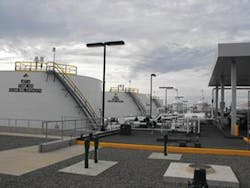A global software development company, specializing in aviation fuel management solutions, has recently conducted research with aviation fuel suppliers and resellers to understand what their biggest day-to-day challenges are in relation to data and administration. The results paint a picture of a sector that is still reliant on time-consuming manual processes, and where there are numerous opportunities for improving business efficiency.
The company behind the research, the FuelPlus Group, held discussions with fuel suppliers and resellers during 2014 and 2015, to help shape its new product aimed at this market: supplier.ONE. This web-based application is designed for suppliers and resellers who service both airlines and general aviation customers, and aims to save them time and money by streamlining fuel desk activities.
FuelPlus uncovered some recurring themes during their research:
Headache 1: Maintaining a single up-to-date list of jet fuel prices
First, being able to maintain a single up-to-date list of fuel prices was by far the main issue for the aviation fuel resellers and suppliers they spoke to, as FuelPlus’ Product Manager for supplier.ONE, Tiberiu Jecza, explains:
"The complexity around how fuel prices are determined, the number of different components that make up the price, and the volatility of the energy market, make this a real administrative pain for most companies,” Jecza says. “Our experience is that organizations are either trying to manage and manually update multiple Excel spreadsheets, or trying to use a generic ERP system (Enterprise Resource Planning). Neither solution works very well.”
David Dykes, Supply, Logistics and Commercial Aviation Manager for the fuel supplier Gulf Aviation, agrees and outlines the real problems with this approach:
“For activities related to pricing, tendering, credit control, stock management and sales and invoicing, we currently use a combination of our ERP system and Excel spreadsheets. This is a fragmented way of working and is very time and resource consuming because a number of tasks are duplicated. It also increases the chance of human errors occurring.”
Tiberiu also reports, in his experience, other problems with this approach.
“Your ability to interrogate, analyze and effectively use the data is also very limited because it’s in different places," he says. "Plus, generic ERP systems weren’t designed with the aviation fuel supply market in mind and suppliers often tell us that as a result, these systems aren’t a good fit with business processes.”
These revelations are worrying for the industry, because clearly, being able to maintain a single up-to-date list of fuel prices is absolutely crucial to the fuel supply business.
Headache 2: Creating a transparent pricing policy
Another closely linked challenge is apparently that many of the aviation fuel suppliers and resellers FuelPlus talked to are struggling to create a pricing policy that can be understood and applied by different members of staff. Due to the complexity of pricing, which could include different mark-ups based on location or fuel volume, as well as the frequency with which price components change, pricing decisions are mainly being taken by the fuel desk manager. This can slow down the process of quoting and responding to fuel requests and, arguably, isn’t the best use of resources.
Headache 3: Monitoring the credit limits of airlines
Another key issue, according to FuelPlus, is that suppliers and resellers need the ability to accurately monitor the credit limits of their airline customers. The main headache here is about keeping credit limits sufficiently up-to-date, bearing in mind the number of refuelling events that could be taking place each day, and the number of fuel tickets this would generate.
Again, the norm seems to be that fuel suppliers and resellers manually maintain this information in Excel files, so the risk of human error and out-of-date information is high, says FuelPlus representatives. This could potentially leave fuel suppliers and resellers financially vulnerable.
“Flightworx Fuel works closely with Flightworx Accounts to monitor credit limits and ensure that there is constant communication with our clients in order to keep things moving,” James Kossick, Fuel Manager for the fuel reseller Flightworx Aviation, says of his company's process. Kossick admits that this is “largely a human task which is performed on a daily basis, and we rely on the suppliers invoices to be correct.”
The reseller’s dependency on information from fuel suppliers is explained further in headache 5.
Headache 4: Operating a slick and efficient fuel request process
In order to supply fuel to a customer at an airport, numerous steps must be taken, appropriate checks made and data from various sources needs to be tied together. For example, when a fuel supplier or reseller receives a fuel request from a customer, they need to check credit, send out authorization to the airport, issue fuel codes, a corresponding fuel order, and so on. As Flightworx Aviation’s James Kossick summarises: “There is a large amount of human influence on any fuel release.”
For most of the fuel suppliers and resellers that FuelPlus talked to, this means manually checking several spreadsheets and copying and pasting information between documents. FuelPlus see this as another waste of skilled resources and one that leaves suppliers at risk of human error.
Headache 5: Capturing fuel ticket information quickly
During their research, FuelPlus also discovered that for aviation fuel resellers in particular, confirmation of the actual amount of fuel uplifted at each fuelling takes a long time to come through.
Tiberiu elaborates: “While fuel tickets are issued to the pilot, airline and fuel supplier, they aren’t given to the resellers. This means that fuel resellers usually have to wait for the suppliers to send an invoice before they know the actual volume sold, and this can create cashflow problems.” He added: “This also means that fuel resellers have to trust fuel suppliers to invoice for the correct amount.”
Fuel suppliers are clearly at an advantage here, but even for them, say FuelPlus, there are inefficiencies. They are faced with the laborious and slow process of gathering and checking hundreds of (often) paper-based fuel tickets and then raising invoices for these.
The drive for automation
It’s perhaps surprising to many, that in the 21st century, much of the work of fuel suppliers and resellers is still manual and resource-intensive. But this is a familiar story for FuelPlus as their CEO, Klaus-Peter Warnke explains: “About 5-10 years ago we saw the same reliance on paper-based, manual processes for invoicing within the industry. It created a lot of inefficiency and as a result, IATA started the initiative to create a standardized electronic (XML) fuel invoice for all parties to use. FuelPlus was part of the taskforce for this initiative and within 5 years, we’ve seen the sector switch from a very manual approach to invoicing to a very automated approach.”
Klaus-Peter is confident that the same transformation can take place within the fuel supply industry for other accounting and procurement activities, so that the difficulties experienced by suppliers and resellers today, will become a thing of the past. In fact, automating the industry is his central mission: “I believe that ultimate business efficiency can only be achieved through the automation of processes,” he explains. “So the FuelPlus vision is to come up with tools that can free fuel professionals of their boring routine activities, so they have more time to spend on areas where they can really add value, such as talking to suppliers, analyzing and interpreting figures, and coming up with new ideas. I compare it to the new self-driving cars that are being developed. We want to create the first completely self-driving aviation fuel management system.”
Their new software for fuel suppliers and resellers, supplier.ONE, which was launched in June, is not quite that yet, says Klaus-Peter, but he certainly believes it’s moving the industry forward and removing many of the common issues highlighted by their research. “There were no products on the market that had been specifically designed for the supply side, only large standardized ERP systems or tools designed for other industries, such as road transport. None of these quite met the needs of the aviation fuel supply industry, so we decided to create our own tool.” He continues: “Thanks to the effort we’ve put into researching this segment of the fuel market, we’re confident supplier.ONE will bring many benefits to fuel suppliers and resellers. For example, users will be able to easily create and maintain a single pricing database for quotes and contracts, which is automatically updated with the latest energy prices and exchange rates. That removes some of their biggest headaches straight away.”
David Dykes from Gulf Aviation is equally hopeful: “Before now, there wasn’t a user-friendly and tailor-made system which could provide a database covering all the key requirements for a supplier: pricing, tendering, credit control, stock management and sales and invoicing. FuelPlus’ new supplier.ONE product looks as if it could be the answer to these problems. We’re very interested in finding out more about it.”
Are you a fuel supplier or reseller? Do these issues sound familiar to you? Let us know on Twitter @GroundSupportWW using #fuelsupplierpain.





